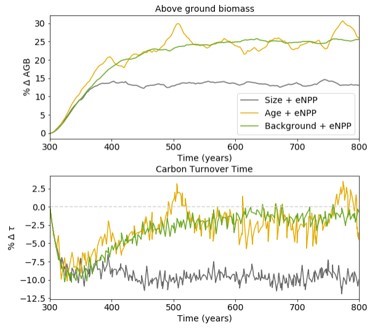July 25, 2020
Role of Tree Mortality in Forest Response to Rising CO2
Scientists use simulations to explore how size- and age-dependent mortality of trees will affect changes in forest carbon storage in response to rising CO2.

Forest responses to simulated elevated CO2 under alternate hypotheses of size- and age-dependent mortality.
[Reprinted with permission from Needham, J.F., et al. “Forest Responses to Simulated Elevated CO2 under Alternate Hypotheses of Size- and Age-Dependent Mortality.” Global Change Biology 26(10), 5734-53 (2020). [DOI: 10.1111/gcb.15254] © 2020 John Wiley & Sons Ltd]
The Science
Researchers used simulations to explore how size- and age-dependent mortality of trees will affect changes in forest carbon storage in response to rising CO2. They found that faster growth as a result of increased CO2 caused increases in forest biomass that were twice as large when mortality was age-dependent compared with size-dependent.
The Impact
Understanding how forests will respond to rising CO2 is critical for predicting changes in the Earth’s climate. The results of this study highlight the importance of understanding large tree mortality.
Summary
Little is known about how the probability of death changes as trees get older and larger. However, as rising CO2 is expected to cause trees to grow faster, it is important that we understand whether this will lead to trees growing larger or whether they will continue to die at the same size, but in less time. This has important implications for the amount of carbon stored in forest ecosystems and how long it is stored. Researchers used simulations to explore how different mechanisms of tree mortality could affect forest carbon storage. They found that increased growth from simulated increases in CO2 caused increases in biomass that were twice as large when mortality was age-dependent compared with size-dependent. Further, they found a much larger decrease in carbon storage time when mortality was size-dependent, as trees move through their life cycles more rapidly.
Principal Investigator
Charles Koven
Lawrence Berkeley National Laboratory
[email protected]
Program Manager
Daniel Stover
U.S. Department of Energy, Biological and Environmental Research (SC-33)
Environmental System Science
[email protected]
Funding
This research was supported as part of the Next Generation Ecosystem Experiments (NGEE)—Tropics, funded by the Office of Biological and Environmental Research (BER), within the U.S. Department of Energy’s (DOE) Office of Science. The PI also acknowledges support from the DOE Early Career Research Program (ECRP). Lawrence Berkeley National Laboratory (LBNL) is managed and operated by the Regents of the University of California under prime contract number DE-AC02-05CH11231.
R. Fisher acknowledges the support of the National Center for Atmospheric Research, which is funded by the National Science Foundation.
References
Needham, J.F., et al. "Forest Responses to Simulated Elevated CO2 under Alternate Hypotheses of Size- and Age-Dependent Mortality." Global Change Biology 26 (10), 5734–5753 (2020). https://doi.org/10.1111/gcb.15254.

